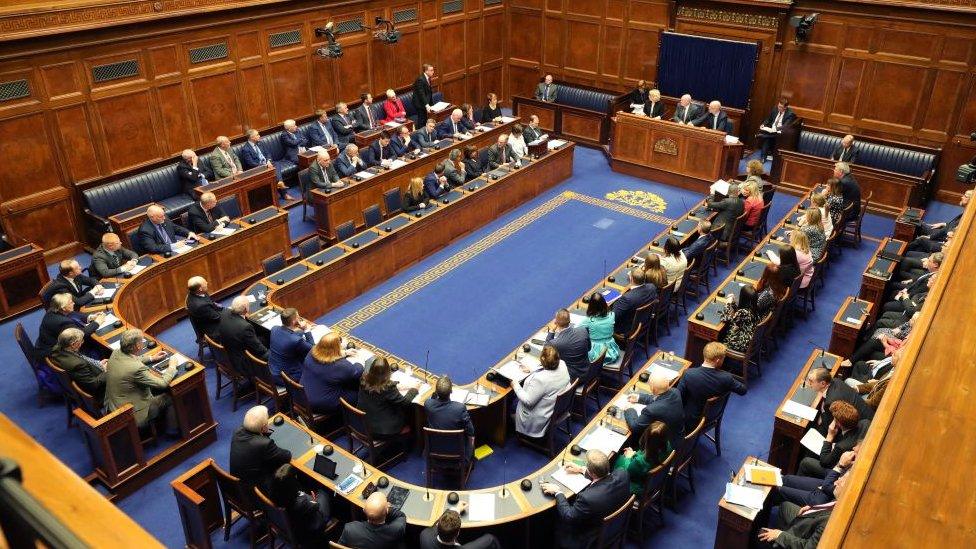Stormont: Why were NI leaders given unequal job titles?
- Published
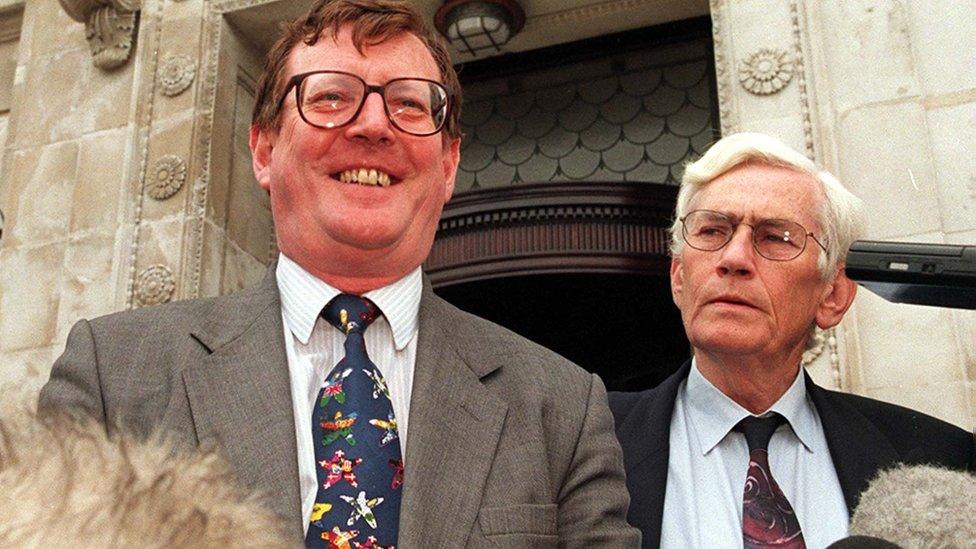
Former First Minister David Trimble and former Deputy First Minister Seamus Mallon in 1998
Why are Northern Ireland's leaders called the first minister and deputy first ministers when both roles are the same?
Despite the unequal job titles, the two leaders have identical powers and responsibilities and one cannot rule without the other.
Who got to to be first minister was a major issue throughout the 2022 election campaign, so why is it so important to be considered a first among equals?
What's the difference?
Although it is a joint office, the current distinction is that the first minister's role can only be held by Stormont's biggest party, which until now has always been a unionist party.
Last week, for the first time in history, an Irish nationalist party has the right to nominate a first minister after Sinn Féin won the most seats in last week's Northern Ireland Assembly election.
However, they still need the co-operation of the Democratic Unionist Party (DUP) - the second largest party in Northern Ireland - in order to take the post and form a government.
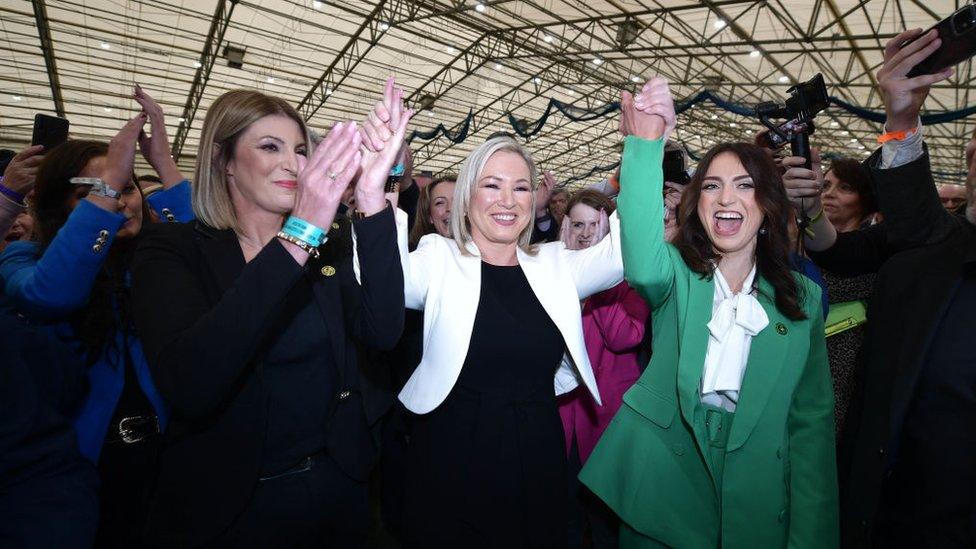
Sinn Féin's Michelle O'Neill (centre) could be in line for the first minister's job, but needs DUP support
Why were the job titles created?
The posts were established under the 1998 Belfast Agreement, commonly known as the Good Friday Agreement.
The deal helped to end decades of violence in Northern Ireland known as the Troubles, as unionists and nationalists agreed to share power in a new devolved government.
From the very beginning, the joint roles were steeped in symbolism, according to one of the architects of the agreement, Mark Durkan from the Social Democratic and Labour Party (SDLP).
But the initial symbolism was meant to promote reconciliation, not hierarchy, he said.
The SDLP proposed a joint office of first ministers, to be elected with cross-community support from both unionist and nationalist assembly members.
Why do the jobs have different names?
According to Mr Durkan, the insistence that the leaders be called first and deputy first ministers came from the Ulster Unionist Party (UUP), which was then the biggest political party in Northern Ireland.
"While the ministers would have joint and equal powers and functions that could only be exercised jointly and equally, they did insist on a differential as far as the titles were concerned," he recalls.
The UUP had spent much of the talks opposing the idea of having any devolved ministers at Stormont.
As the talks progressed the UUP agreed to set up a power-sharing executive led by two ministers, but wanted the job titles to differ.
"They believed that was going to be important to how they could sell this change in their position to their members, and indeed, to the wider unionist public," Mr Durkan says.
"So basically we were faced with letting the talks break down on the question of the names or getting substantive agreement on this institutional model."
Former UUP leader Sir Reg Empey was the party's chief negotiator during the All-Party Talks.
He said there was a realisation the first-past-the-post Westminster model wasn't going to work for devolved government in Northern Ireland.
"You weren't going to get buy-in from nationalism. We had to look for a different model," he recalls.
"Scottish devolution was coming to fruition and we wanted a bit of consistency within the UK if possible."
Originally, the UUP favoured a local government model run on a committee basis.
"We came under pressure from a number of sources. People felt that you needed to have ministers who were identifiably heads of department and government," added Sir Reg.
How does the balance of power work?
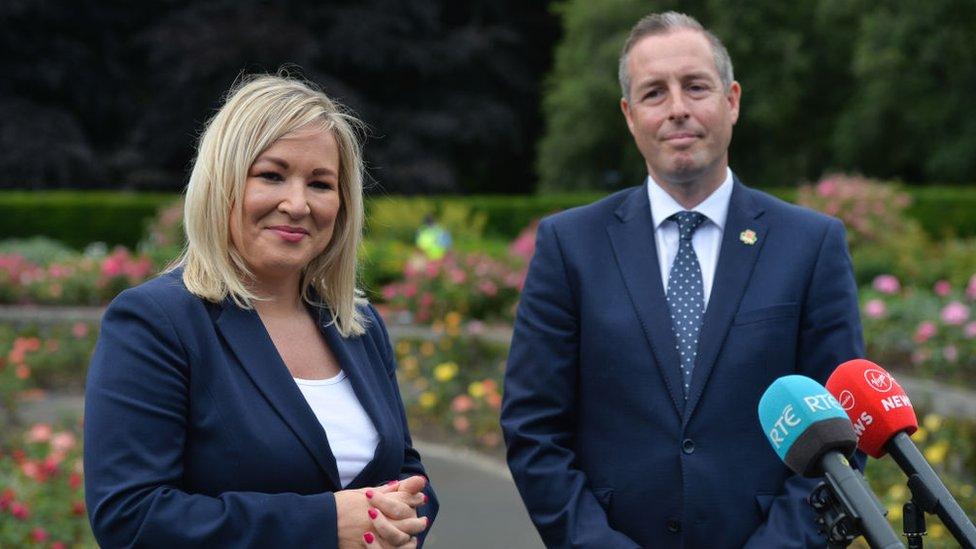
Michelle O'Neill lost her job in February when the DUP's Paul Givan quit as first minister
If a first minister quits, the deputy first minister automatically loses their job and vice versa.
This safeguard was put in place to protect the principal of power-sharing but it has also left Stormont without a functioning government for more than a third of its lifespan.
It is a marriage of inconvenience?
Some of Stormont's power couples got on better than others.
Firebrand DUP founder Ian Paisley and former IRA man Martin McGuinness of Sinn Féin laughed so much together that the media nicknamed them the Chuckle Brothers.
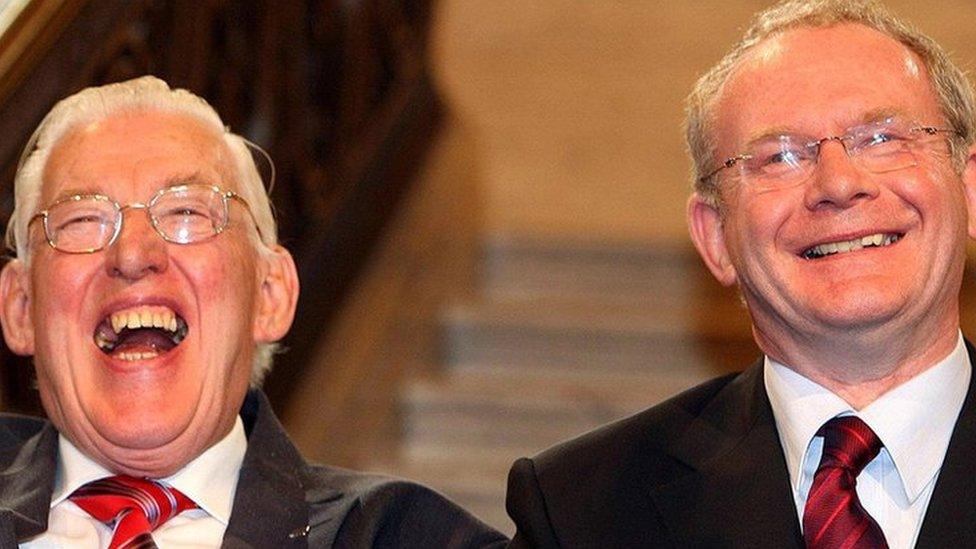
Ian Paisley and Martin McGuinness after being sworn in to office in 2007
Mr McGuinness did not appear to object when Mr Paisley regularly referred to him as "the deputy", but after the DUP leader retired, Mr McGuinness angrily rebuked another DUP member for using the term.
"I'm not the deputy. I'm the deputy first minister in a department where there is equality between the first minister and myself. And don't you ever forget it," he said in 2009.
Sinn Féin began regularly using the term "joint first ministers" and in 2015 Mr McGuinness proposed a formal change to the titles, but there was no agreement.
The word "deputy" is sometimes wrongly played up by the media, according to Mark Durkan, who served as deputy first minister alongside David Trimble in 2001.
He said their joint leadership was respected and he was never made to feel anything less than Mr Trimble's equal, including during international visits.
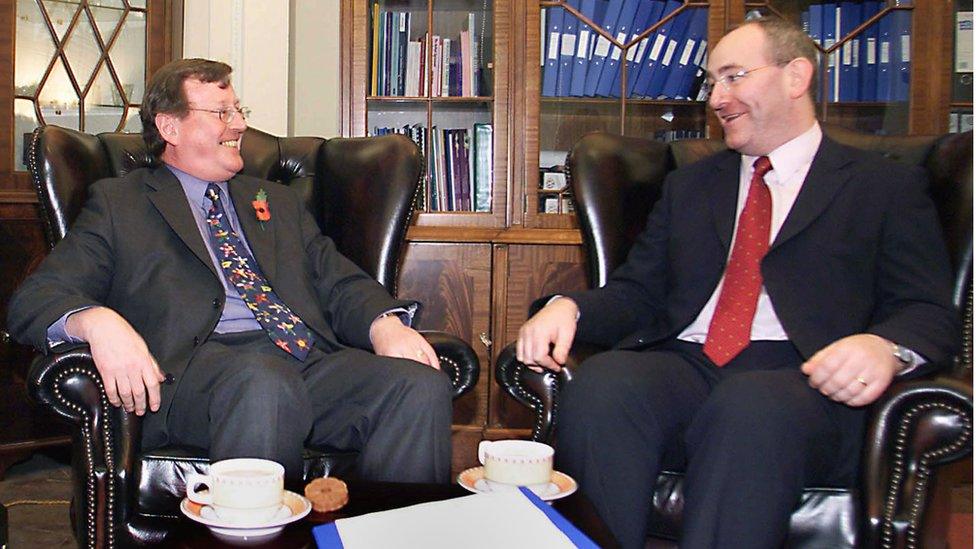
David Trimble and Mark Durkan pictured on the day they were jointly elected as leaders in 2001
How has the appointment process changed?
Initially both posts were jointly elected by the assembly with cross-community support from both unionist and nationalist members.
That rule changed in 2006, when the St Andrews Agreement, external gave Stormont's biggest party first pick for the first minister's job.
The DUP and Sinn Féin agreed the move but both the UUP and SDLP strongly opposed it.
"The decision to change this at St Andrews so that the first minister would come from the largest party - regardless of whether or not it was part of the largest designation - was a major mistake which we warned about at the time," a UUP spokesperson said.
The party has tried to reverse the rule change on a number of occasions - just a few months ago its peer Lord Empey proposed an amendment in the House of Lords.
What are the chances of creating 'joint first ministers'?
Allow X content?
This article contains content provided by X. We ask for your permission before anything is loaded, as they may be using cookies and other technologies. You may want to read X’s cookie policy, external and privacy policy, external before accepting. To view this content choose ‘accept and continue’.

Sinn Féin, the SDLP and Alliance all previously lobbied to rename Stormont's top jobs to properly reflect their equal status.
But during this year's election campaign Sinn Féin leader Mary Lou McDonald indicated her party's position has changed since Martin McGuinness suggested a joint office of first minister in 2015.
"Martin didn't get a very positive response to his proposal at the time," Ms McDonald said to the BBC's The View last month.
"I'm not proposing that we change the job title."
The UUP said any change "would need to be done after the widest possible negotiations and consultations so as to avoid a repetition of the seedy back door deal that emerged at St Andrews".
Mr Durkan said that renaming the roles to reflect the joint and equal nature of the office would be the "mature thing to do".
Related topics
- Published12 May 2022
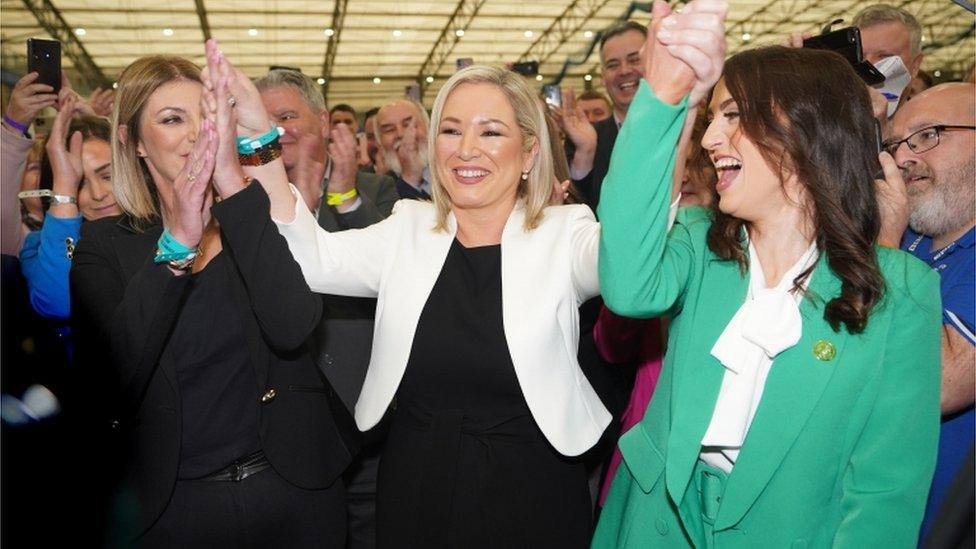
- Published12 February 2022
